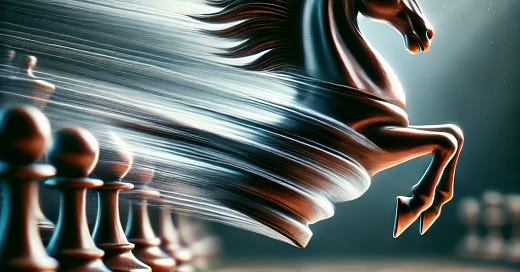What It Means to Be an Adult Chess Improver
Reflections on My Journey, Challenges, and Growth in the World of Chess
Understanding the Journey of an "Adult Improver" in Chess
When people hear the term adult improver, they may have different interpretations. For many, it conjures an image of someone over 20 years old, who has made significant progress in chess—often improving by several hundred rating points in a short period.
If that’s the standard measure, I might not fully qualify as an adult improver. Perhaps my understanding of the term is influenced by the stories I’ve heard on various chess podcasts. These often feature players who have rapidly improved, sometimes even attaining International Master (IM) or FIDE Master (FM) titles, or are on the verge of reaching Grandmaster status.
While such cases are not representative of the average adult improver, they tend to capture the most attention. After all, the faster one progresses, the more impressive it seems—especially for adults, who face unique challenges in advancing their skills. The reality is that for many adult chess players, improving in chess becomes more difficult as we age. Time, focus, and even cognitive agility are all factors that aren’t always on our side.
My Personal Chess Journey
By the typical definition, I might be a late bloomer in the adult improver category. Still, I’ve improved by over 600 rating points in blitz chess on Chess.com since I began taking the game more seriously. I created my first account back in 2009, played a few games, and then again in 2011, but the online chess world didn’t captivate me at that time. The landscape was different—social media wasn't as prevalent, and the internet chess community hadn't yet reached the vibrant state it enjoys today.
Fast forward to 2020, when The Queen’s Gambit aired on Netflix. That show reignited my passion for chess, and since then, I’ve played over 10,000 games on Chess.com. Even though I’m currently hovering around a 727 rating in blitz, with a peak of 986, the progress I’ve made is evident.
Blitz chess can be particularly addictive, and one bad evening can cause a dramatic rating drop. Climbing back up can take weeks or even months, but I’ve learned that improvement is not always reflected by the current rating number.
A Caution Against Over-Reliance on Ratings
I’ve realized that focusing solely on my blitz rating to measure success can be misleading. While I’m better than 59.6% of blitz players on Chess.com, according to my current rating, the system is influenced by a variety of external factors. For instance, the influx of new players and the growing popularity of online chess may have created inflationary effects on the ratings.
More importantly, I’ve found that playing against the same opponents from time to time provides better feedback on my actual improvement. Beating someone who used to defeat me consistently feels like a true measure of progress. Reviewing my old games is another way to see how far I’ve come, noticing the increase in my understanding of the game over time.
Chess in the Age of Social Media
Today’s chess environment is heavily influenced by social media. Algorithms on platforms like YouTube and Instagram serve endless chess videos, maintaining and even fueling my interest. Players who once might have been seen as nerdy or eccentric, not just in the chess world but in general, are now revered as rock stars, thanks in part to these platforms.
This environment didn’t exist in 2009 or 2011 when I first dipped my toes into online chess. Social media has undoubtedly played a significant role in making chess more popular and accessible, helping many players—including myself—stay motivated.
Looking Forward
As I continue my chess journey, I’ve made a resolution (and not for the first time) to stop playing so much blitz and focus more on Rapid games that last at least 15 minutes. This shift should help me concentrate more on improving my skills rather than chasing the rush of quick wins or recovering from rapid losses.
Ultimately, improvement in chess is personal. Whether or not I achieve a high blitz rating, the growth in my understanding and ability to play better against familiar opponents is the real reward. That, to me, is the essence of being an adult improver.
Thank you for reading! I’m always open to hearing other chess improvers’ stories, so feel free to share and comment.





